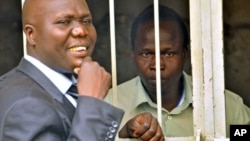U.S. officials are defending an ongoing U.S. military mission to help wipe out the roving Lord’s Resistance Army in Central Africa. Some critics fear, however, the operation could be ineffective.
U.S. military officials say U.S. troops conducting the anti-LRA mission are now stationed at bases in Uganda, the Democratic Republic of Congo, South Sudan and the Central African Republic.
The top U.S. special operations commander for Africa, Brian Losey, said U.S. officials are already seeing a decrease of what he calls the “lethality of LRA activities.”
At a recent event in Washington, top State Department official Karl Wycoff echoed those remarks.
“In the last several months, scores of people have defected, escaped or been released from the LRA’s ranks. This is a welcome development,” said Wycoff.
Wycoff also made clear why President Barack Obama decided last year to send about 100 U.S. troops to help African countries battle the LRA.
“It is intrinsically an organization that needs to be removed, eliminated, reduced, so that it is no longer a threat to regional security and human security,” said Wycoff.
The group emerged in northern Uganda in the late 1980s as an anti-government and religious rebellion. It is believed to have killed, kidnapped and mutilated tens of thousands of people over the past 25 years in wide areas of Central Africa.
Nearly half a million people remain displaced because of the violent group.
The group has been pushed out of Uganda, and its elusive leaders now are believed to be hiding in the Central African Republic, while a core group of 50 fighters has been waging attacks in the Garamba area of the Democratic Republic of Congo.
Researchers who have studied the LRA say the group’s ideology remains based on revenge against Uganda’s government for past abuses on northern ethnic Acholi people.
A main partner of the U.S. mission is long-time and increasingly autocratic Ugandan President Yoweri Museveni. This worries Uganda expert Joel Barkan from the Center for Strategic and International Studies in Washington.
“Unless there is a healthy relationship and particularly long-term peace, security and development in Uganda, it seems that the pursuit of the LRA will ultimately fail,” said Barkan.
Regional experts say the task at hand also is extremely difficult, and may require a U.S. commitment that is longer than possible.
They also say it goes much beyond simply capturing or killing LRA leader, Joseph Kony. The guerilla leader has faced an International Criminal Court arrest warrant for crimes against humanity and war crimes since 2005.
But researcher Ledio Cakaj said it is not even certain he is still alive.
“As far as we know, Kony could be dead already. It is just hard to know. You have people who pretend to be him. His brother looks like him. At least as far as the Congo group is concerned, they operated without Kony for a while,” said Cakaj.
Cakaj said that even though the LRA often is described as a ragtag cult led by a madman, he asserts it is a very organized group of highly skilled fighters operating in extremely difficult terrain.
He said they move along waterways in forested areas where the rainy season will start soon, which will make it very difficult for even U.S. aided militaries to track them down.
Additionally, Cakaj worries about abuses committed by Ugandan soldiers involved in anti-LRA missions, including accounts of rape of civilians in affected areas, and cross-border timber smuggling, which also could have destabilizing effects.
The anti-LRA pressure group Resolve is urging more U.S. funding in the effort, now estimated at about $40 million. One suggestion is to pay for helicopters to track down the insurgents.
Researchers and activists also point out the same military actors, including U.S. advisors, were involved in previous and failed attempts to wipe out the LRA.
Four years ago, a Uganda-led military effort with U.S. funding and planning led to a surge of deadly LRA attacks.
US Defends Ongoing LRA Mission Amid Criticism




